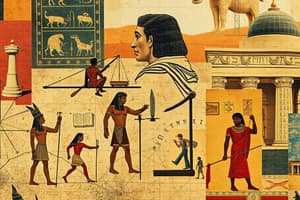Podcast
Questions and Answers
Which ancient civilization introduced the sexagesimal numbering system?
Which ancient civilization introduced the sexagesimal numbering system?
- Babylonians
- Sumerians (correct)
- Assyrians
- Persians
Who was considered the creator of all things and the head of the pantheon in Mesopotamian religion?
Who was considered the creator of all things and the head of the pantheon in Mesopotamian religion?
- Marduk (correct)
- Ashur
- Enlil
- Ishtar
Which ancient civilization was known for their focus on military power and expansionism?
Which ancient civilization was known for their focus on military power and expansionism?
- Babylonians
- Persians
- Assyrians (correct)
- Sumerians
Which group was defeated by the Medes and Persians in 612 BCE?
Which group was defeated by the Medes and Persians in 612 BCE?
Which ancient civilization built massive fortress cities with walls up to 60 feet high?
Which ancient civilization built massive fortress cities with walls up to 60 feet high?
Which civilization introduced zodiac signs in ancient times?
Which civilization introduced zodiac signs in ancient times?
Which ancient civilization from Mesopotamia is credited with inventing cuneiform writing?
Which ancient civilization from Mesopotamia is credited with inventing cuneiform writing?
Which civilization from Mesopotamia was known for its city Babylon and its contributions to mathematics, astronomy, art, and religion?
Which civilization from Mesopotamia was known for its city Babylon and its contributions to mathematics, astronomy, art, and religion?
Who conquered the Sumerians and ultimately absorbed them into their civilization?
Who conquered the Sumerians and ultimately absorbed them into their civilization?
Which civilization from Mesopotamia emerged after the collapse of the Akkadians?
Which civilization from Mesopotamia emerged after the collapse of the Akkadians?
Which civilization established urban settlements and developed skilled craftsmanship and commerce among the earliest in history?
Which civilization established urban settlements and developed skilled craftsmanship and commerce among the earliest in history?
Which civilization's society was divided into social classes ruled by kings, resembling early political systems in other regions like Egypt?
Which civilization's society was divided into social classes ruled by kings, resembling early political systems in other regions like Egypt?
Flashcards are hidden until you start studying
Study Notes
Mesopotamia: A Land of Three Civilizations
Mesopotamia is a geographical region located between the Tigris and Euphrates rivers. It has been known throughout history for its complex civilizations and their significant contributions to human development and culture. This article delves into three major groups that inhabited this land – the Sumerians, Babylonians, and Assyrians – examining their distinct cultural characteristics and impact on world history.
The Sumerians
The ancient civilization of the Sumerians originated around 3800 BCE near present-day Iraq's southern marshes. They were among the earliest people known to have established urban settlements and developed skilled craftsmanship and commerce. Their society was divided into social classes, with kings ruling over them, similar to what would later develop into the political systems of Egypt and other early societies. Despite being conquered by the Akkadian Empire led by Sargon I and eventually absorbed by the Semitic Akkadians, they left behind a lasting legacy through inventions such as cuneiform writing, which laid the groundwork for written communication, and advanced mathematical concepts like base sixty counting system.
The Babylonians
The second prominent group from Mesopotamia were the Babylonians who emerged after the collapse of the Akkadians. Known primarily for their renowned city, Babylon, this civilization also contributed significantly to mathematics, astronomy, literature, art, and religion. Mathematical advancements included the sexagesimal numbering system and Pi estimation based on circle circumference measurement. In astronomy, the Babylonians created catalogues of celestial bodies, observed lunar cycles, and introduced zodiac signs. Literature flourished with epic poems like 'Gilgamesh', while art saw the rise of large sculptures and magnificent architecture. Religiously, they worshipped multiple gods and goddesses, each responsible for different aspects of life. One notable deity was Marduk, considered the creator of all things and head of the pantheon.
The Assyrians
From the 9th century BC, another group that rose to prominence was the Assyrians. Initially occupying northern Mesopotamia, they expanded southwards and ultimately ruled much of Mesopotamia. Unlike the Babylonians whose rule was often religious and ceremonial, the Assyrian rulers focused more on military power and expansionism. Under King Ashurnasirpal II, Assyria reached its peak, establishing itself as the dominant regional power. The Assyrians were known for building massive fortress cities with walls up to 60 feet high, defensive moats, palaces, temples, and grand columns. Their administrative prowess ensured efficient tax collection and control over vast territories. However, their relentless expansionism led to conflicts with the Medes and Persians who defeated them in 612 BCE, ending their reign.
In conclusion, these three great civilizations - the Sumerians, Babylonians, and Assyrians - shaped the course of humanity's progression by laying foundations in various fields ranging from agriculture to science and philosophy. Each group brought unique perspectives and achievements that collectively enriched our understanding of ancient cultures and paved the path for future developments.
Studying That Suits You
Use AI to generate personalized quizzes and flashcards to suit your learning preferences.




